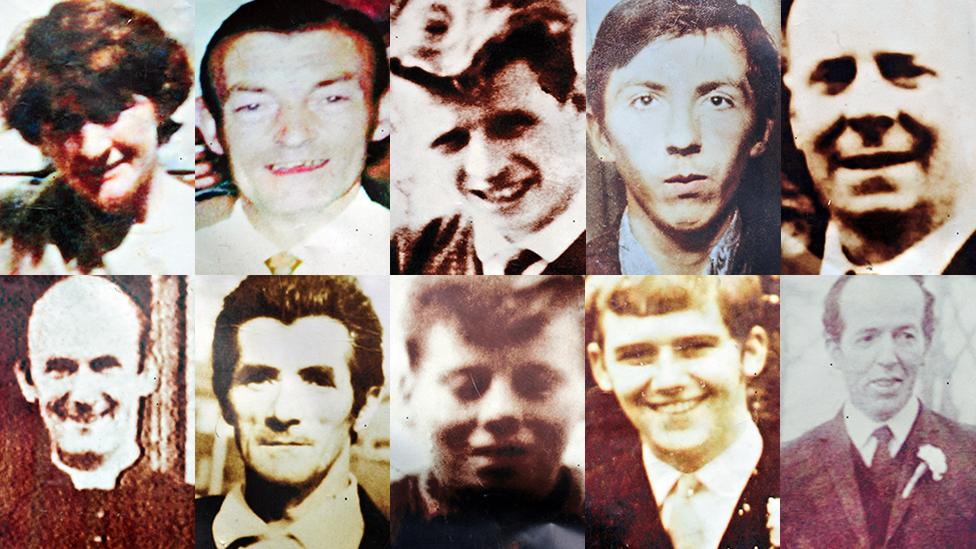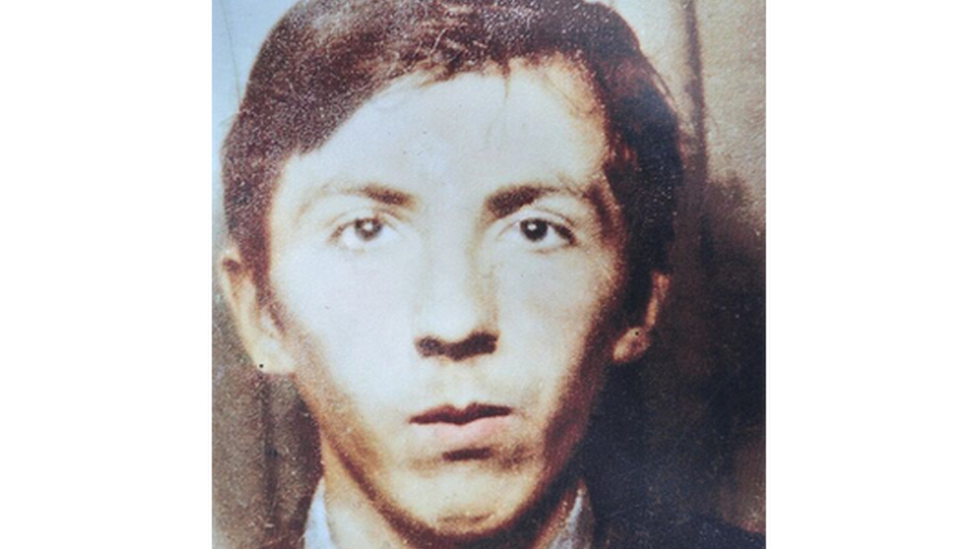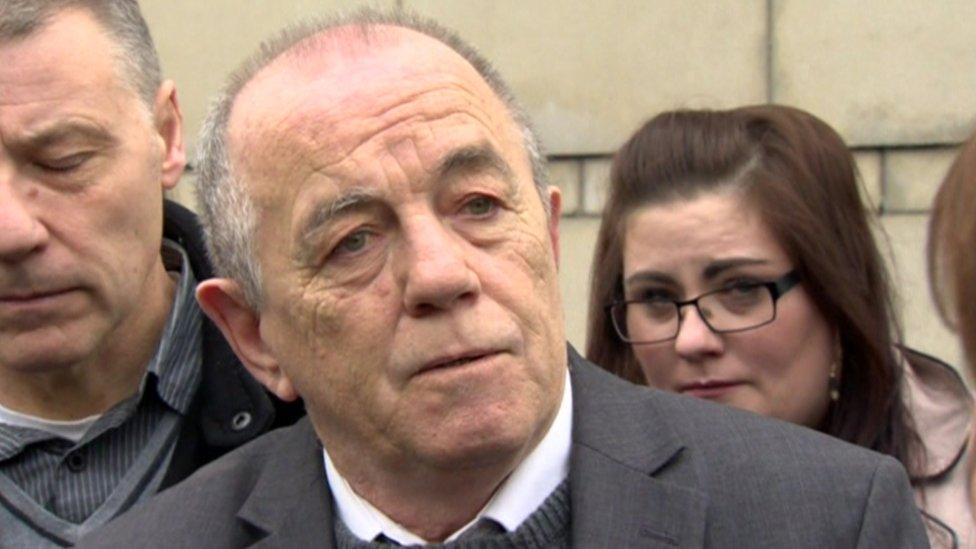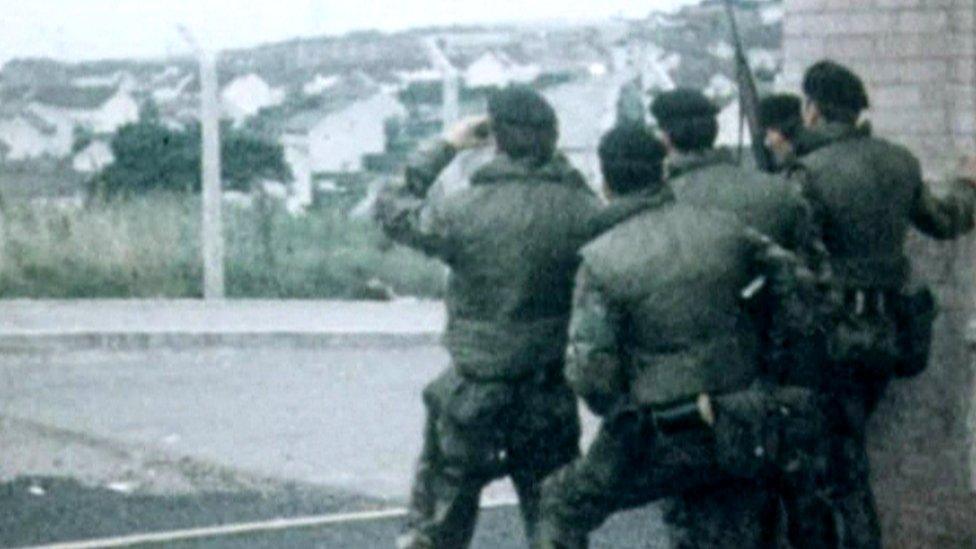Ballymurphy Inquest: Soldier 'boasted of shooting someone'
- Published

Nine men and a woman were killed in Ballymurphy in August 1971
The Ballymurphy Inquest has heard the claims of a man who said he was beaten and abused by paratroopers, one of whom boasted he had already shot someone.
Terence Laverty has been excused from giving evidence in person due to ill-health.
As a result, several of his statements over the years were read out in court.
In them, Mr Laverty said he only learned that his brother John had been shot dead, a full two days after he himself was arrested.
Ten people were fatally shot - including six on one day - in the Ballymurphy area in August 1971 after the introduction of internment without trial in Northern Ireland.
Twenty-year-old John Laverty was shot dead, and 43-year-old Joseph Corr fatally wounded, on the upper Whiterock Road on 11 August 1971.
Soldiers from 1 Para had advanced down the road from Black Mountain as part of operations following the introduction of Internment.
Terence Laverty's statements said that he was arrested and beaten by soldiers for some hours, at one point being chained to railings alongside another man.
He admitted he had initially made up a story to the authorities about why he was in the area so early in the morning.
He said that was because he had been prepared to join a riot, and along with his brother had tricked their mother into letting them leave the house.

John Laverty was 20-years-old when he was shot dead
He did not want his parents to know why he had gone out that morning.
He said that in the event he never found a riot to join, and had done nothing wrong when he was arrested.
Terence Laverty was however convicted of rioting and served six months in prison, but that conviction was quashed in 2015, after evidence from a soldier was retracted.
Mr Laverty said he believed the soldier who had boasted of shooting someone was M167.
His statement described the soldier using him as human shield for cover whilst returning fire at a gunman close to a nearby school.
Mr Laverty also said the soldier put the barrel of his self-loading riffle (SLR) to his head and pulled the trigger.
Thinking he was going to die, the statement said, Mr Laverty then realised the soldier had removed the magazine from the weapon before pulling the trigger.
He described later being beaten and abused by military policemen wielding batons, and held at Girdwood Barracks for two days before being charged.

Terence Laverty's conviction for rioting was quashed in 2015
The court was later read the detailed and lengthy statement of Soldier M167, who was a medic in 9 Platoon, C Company 1 Para.
He described coming under fire several times, but did not describe shooting anyone.
He did say he saw casualties as he came down the Upper Whiterock Road.
The former soldier said he thought he might have seen weapons lying near them, but could not be sure.
In his statement, M167 said that he arrested Terence Laverty and one other man because he had seen them rioting earlier.
He denied that he had ever retracted his statement about the arrest, allowing Mr Laverty's conviction to be quashed.
The court heard that M167 and a Historical Enquiries Team (HET) investigator had very different memories of elements of a meeting they had had.
'Not worthy of belief'
Later, another soldier denied lying to the inquest about his memory of shootings in which Mr Corr and Mr Laverty died.
Former sergeant M365 returned to court to continue his evidence after it was halted on Tuesday.
In his evidence, he told the court he had no memory of the shootings and was not present at the time.

Soldiers in Ballymurphy in 1971
Again he raised doubts about which platoon in C Company 1 Para he had been in during the time in question.
A barrister for the Laverty family suggested he was "not capable or worthy of belief", something he denied.
Fiona Doherty QC confronted the witness with evidence from the Bloody Sunday Inquiry, and his disciplinary record.
The court heard M365 was convicted of six counts of fraud for falsifying expenses and accepted a discharge from the Army in 1984, having been demoted to private.
However he insisted he had no memory of the incidents he was asked about.
"That's the truth what I said, that is the truth." he told the court.
Later Soldier M433, who was a lance corporal that day, described coming across the body of a young man lying on the Upper Whiterock Road, as his men advanced down it.
He said that he and a medic looked at it and concluded the man was dead.
He testified that the body was some distance away from where other witnesses had reported it.
- Published11 May 2021
